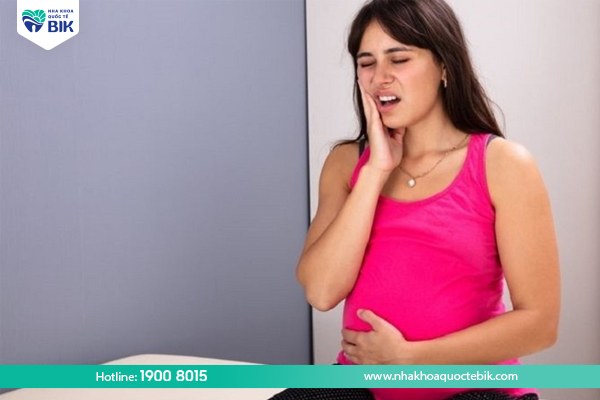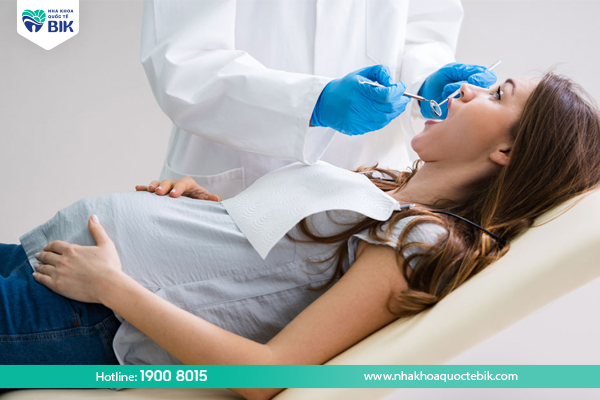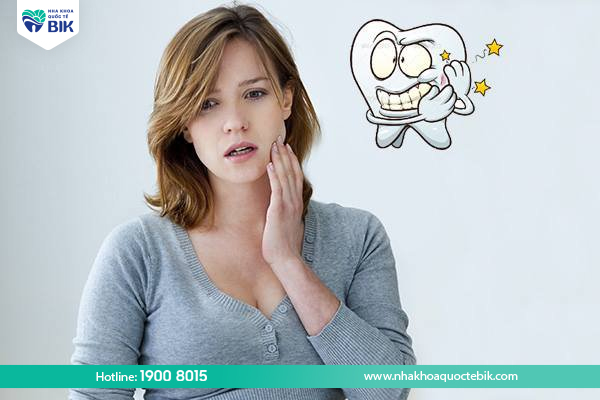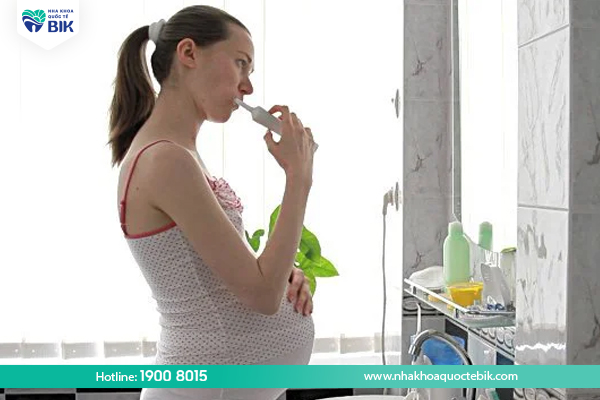Is it okay to have a tooth extracted while pregnant? This is a common question for many pregnant women. Because most women when pregnant suffer from oral diseases such as tooth decay or frequent toothaches. Refer to the article below by BIK International Dental Clinic to answer your concerns!

What oral diseases are pregnant women susceptible to?
According to dentists, pregnant women are at higher risk of oral diseases than non-pregnant women. At this time, hormonal changes in the body occur continuously, especially in people with poor health. This leads to swollen gums and creates conditions for bacteria to accumulate calcium, causing tooth decay and gingivitis around the teeth.
A diet rich in sugar and starch also creates conditions for bacteria to grow, causing tooth decay. Changes in salivary glands during pregnancy also affect oral health. Less saliva secretion also increases the risk of tooth decay.
Pregnant women who have tooth decay or toothache should be careful not to use pain relievers arbitrarily without a doctor’s prescription.
To relieve pain, you can apply natural measures such as cold compresses, gargle with warm salt water, and gently massage the painful tooth area. After that, you need to go to the dentist immediately for a doctor to examine and treat promptly.

Can pregnant women have their teeth extracted?
Tooth extraction during pregnancy is only performed when the tooth is severely decayed, seriously damaged and cannot be restored by other means. So is tooth extraction safe for pregnant women?
According to dental experts, pregnant women can still have their teeth extracted during pregnancy. However, this is not recommended because it can affect the health of both mother and fetus. If it is not urgent, doctors will often postpone tooth extraction to ensure the safety of pregnant women.

Why pregnant women are not encouraged to have their teeth pulled
Although tooth extraction is simple, it can still cause blood loss for pregnant women. During pregnancy, maintaining health and blood circulation is very important to provide oxygen and nutrients to the fetus.
For complicated tooth extraction cases such as wisdom tooth extraction, molar tooth extraction, … this process will become much more complicated. The doctor needs to use anesthetics to control pain during tooth extraction. Although the dose of anesthetic used is safe, it can still affect the fetus through the blood.
In addition, tooth extraction and tooth loss can also cause stress for pregnant women, negatively affecting their mood and mental health, thereby affecting the fetus.
The right time for tooth extraction for pregnant women
The best time for tooth extraction during pregnancy is from the 4th to the 6th month, when the fetus’s body has fully developed. However, tooth extraction in the first and last 3 months of pregnancy requires a thorough examination by a dentist and the support of an obstetrician to avoid any unwanted risks for the mother and fetus.
If the tooth decay has not developed seriously and is not painful, the doctor may prescribe painkillers and antibiotics for the pregnant woman to reduce the feeling of discomfort. However, the most important thing is to wait until after giving birth and when your health is stable before proceeding with tooth extraction.

Proper oral care for pregnant women
Here are some oral care tips that pregnant women can follow:
Proper oral hygiene
Proper oral hygiene is a measure to help limit and prevent oral diseases more effectively. Here are the correct oral hygiene methods that pregnant women need to pay attention to:
- Brush or scrape your tongue daily to remove harmful bacteria.
- Brush your teeth properly at least twice a day. Combine the use of mouthwash and dental floss to thoroughly remove plaque.
- Do not brush your teeth immediately after eating or drinking tea or coffee, but wait 10-20 minutes to avoid affecting the enamel.
- Rinse your mouth thoroughly after vomiting to remove saliva containing acid – this is the agent that causes tooth enamel erosion.

Regular dental check-ups
Pregnant women are often susceptible to dental problems, so regular dental check-ups and cleanings at the dentist are important. According to experts, pregnant women should visit the dentist every 6 months so that the doctor can monitor and treat dental problems effectively.
Build a scientific diet
In addition to oral hygiene care, maintaining a healthy diet also helps strengthen oral health and prevent tooth decay.
- To supplement the daily diet with foods rich in calcium, vitamin C, vitamin B12. Eat more foods that are good for your teeth such as apples, oranges, green tea, cheese, yogurt, etc.
- Limit the consumption of foods high in starch and sugar, as they can cause tooth decay and pulpitis during pregnancy.
- Avoid eating foods that are too cold or too hot to avoid irritating your teeth and causing pain
- Drink enough water to create natural saliva, which helps prevent tooth decay.
Hopefully, the information from BIK International Dental Clinic has helped pregnant mothers better understand whether it is okay to have teeth extracted during pregnancy. Pregnant mothers need to have regular dental check-ups to control their oral health. In case tooth extraction is necessary, they should be consulted by a dentist and a product specialist.


















